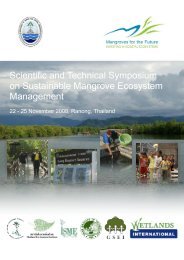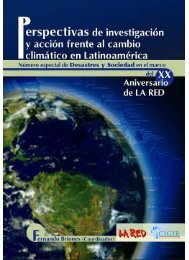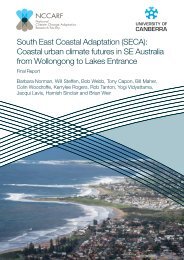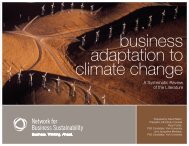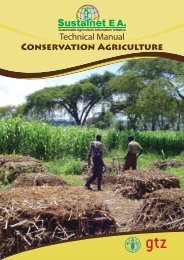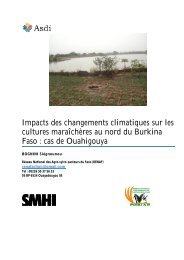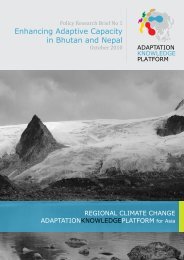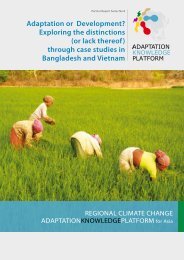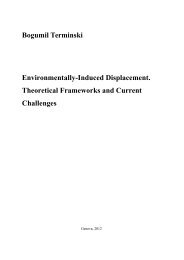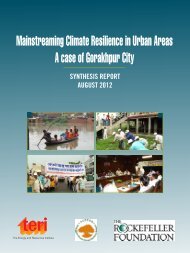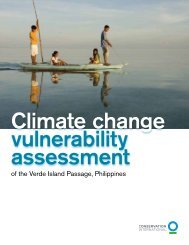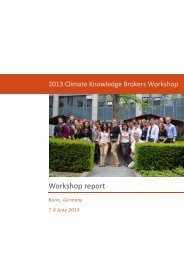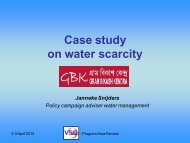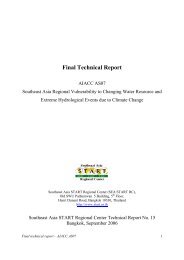Urban food security, urban resilience and climate change - weADAPT
Urban food security, urban resilience and climate change - weADAPT
Urban food security, urban resilience and climate change - weADAPT
You also want an ePaper? Increase the reach of your titles
YUMPU automatically turns print PDFs into web optimized ePapers that Google loves.
organisation in the past few years. On the Gold Coast, four interviewees arecommunity gardeners, one is a <strong>food</strong> policy officer, <strong>and</strong> four are local growers who alsoplay roles in community agriculture organisations in the city.Drawing on the desktop literature review, as well as the research team’s ownknowledge of key region-specific literature, the topic guide was structured around thekey research themes of <strong>food</strong> <strong>security</strong>, <strong>urban</strong> agriculture, <strong>climate</strong> <strong>change</strong> <strong>and</strong> <strong>urban</strong><strong>resilience</strong>. There was a particular focus on exploring the nexus amongst these fourthemes, in order to explore, for example, the ways in which interviewees believed that<strong>climate</strong> <strong>change</strong> might affect <strong>urban</strong> agriculture; <strong>and</strong> conversely, how the practices of<strong>urban</strong> agriculture could contribute to higher levels of <strong>climate</strong> <strong>resilience</strong> in the future.The length of the interviews ranged from 30 to 90 minutes, with most lastingapproximately 60 minutes. The interviews were conducted at a location convenient tothe interviewee. In many cases, this was at their workplace or home; while in others itwas in an external venue such as a café.The interviews were conducted according to an ethics protocol approved by bothGriffith University <strong>and</strong> The University of Queensl<strong>and</strong>’s Human Research EthicsCommittee’s. All interviewees were given a project information sheet, describing instraightforward language the aims of the research, its design <strong>and</strong> the benefits thatmight flow from it. They were also informed of the way that information they gave <strong>and</strong>any opinions expressed would be used in the research <strong>and</strong> assured that they would notbe identified in any subsequent publications (including having any direct quotesattributed to them) without their express consent. For that reason, we have adopted atypology of interviewees, set out below, in order to describe the type of intervieweewithout identifying them individually.Potential interviewees were identified via a key informant approach. Using the networks<strong>and</strong> experience of project team members in both cities, we contacted a small numberof individuals who had over a number of years played a leading role in the fields of <strong>food</strong><strong>security</strong>, <strong>urban</strong> agriculture <strong>and</strong> sustainable <strong>food</strong> systems, <strong>and</strong> sought theirrecommendations for potential interviewees. Those individuals were then contacted<strong>and</strong> during the initial round of interviews we asked for their recommendations regardingother potential interviewees, also known as snowball sampling.While we do not claim either to have identified or interviewed all the relevant individuals<strong>and</strong> organisations in this field in Melbourne <strong>and</strong> the Gold Coast, we are confident thatmost of those playing a significant role in local <strong>food</strong> policy development <strong>and</strong> practicehave been engaged.Interviews were recorded <strong>and</strong> notes also taken during the interviews. Most interviewrecordings were transcribed for use in the analysis stage.As mentioned above, interviewees participated in this research on the underst<strong>and</strong>ingthat their confidentiality would be protected. We have therefore adopted the followingtypology of interviewees in order to attribute direct quotes <strong>and</strong> opinions to them:state government employeelocal government employee<strong>Urban</strong> <strong>food</strong> <strong>security</strong>, <strong>urban</strong> <strong>resilience</strong> <strong>and</strong> <strong>climate</strong> <strong>change</strong> 10



